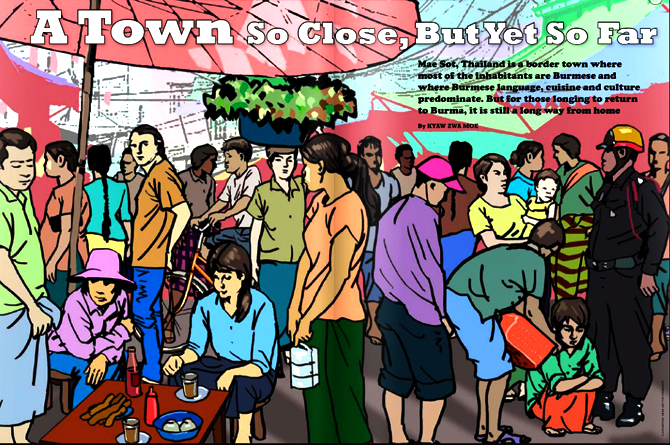When we arrive at Ho Paing, he appears overcome by nostalgia and mutters under his breath, “Oh what has brought me here again after ages?”
The village sits in the middle of emerald green paddy fields and is camouflaged by large shade trees. Wrapping a red scarf around his head, Hla Phu explains that it was here that he and the other PDP troops made camp in the early 1970s. “One of the barracks used to be there,” he says, pointing to a patch of empty land under a tree. “I lived in that barrack. It had 14 beds.”
He shows me a well, now covered by bushes, which they had used for drinking water, and while we walked along a small path between paddy fields, he continues to point at different places and recall life as a PDP foot soldier. “Our troops were several hundred in strength, so for lunch we had to start cooking at 2 a.m.,” he says. “We used four or five very large woks.”
Life was simple then, Hla Phu says, explaining that their houses were built with bamboo and thatch and they bathed in a creek. But this was apparently too simple for some of his comrades, as Hla Phu tells me that 50 to 60 percent of the troops he served with had not joined to sacrifice for their country with genuine revolutionary spirit or conviction, but rather because they heard that U Nu’s army was rich and paid in gold coins. Eventually, these sunshine patriots ran away when faced with having to live in the jungle and wake up at 5 a.m. to go through military training.
Seeing this, Hla Phu realized that the revolution would either take a long time to succeed, or would be short lived for lack of properly motivated troops. So he prepared for both—soon after arriving in Mae Sot, Hla Phu began studying under a senior medical student, both with the aim of serving the troops as a medic and earning a livelihood if the army disbanded.
“I saved several lives here,” he says when we arrive at the creek. “One incident involved a former monk in our troop named Than Myint, who we called Phone Gyi (monk) Than Myint. He took poison after feeling depressed about his relationship with his girlfriend. We had no medicine, so I told my colleagues to catch a duck swimming in the creek. They had no idea how a duck could help with the poison, but I knew that a duck’s blood can make a person vomit—it’s a traditional method. I cut the bird’s throat and threw the blood into Than Myint’s mouth, and he immediately emptied his stomach. We sacrificed one duck to save one person’s life.”
Prior to 1979, when he moved into Mae Sot, Hla Phu was the only “doctor” for many villagers in Ho Paing, and he personally won over the hearts of Thai villagers by treating their medical ailments. “Having compassion and sympathy, I think I became a good medic,” he said. “Those qualities are the foundation to become a good professional in every field.”
When he moved to downtown Mae Sot, Hla Phu made a living providing medical care to Burmese, including many ethnic Karen, and some Thai people. “My patients used to wake me up in the middle of the night. I lived on that profession until 1992, but it was illegal as I held no certificate. There was only a clinic run by a Thai doctor and he charged 100 baht at that time. I just charged about 20 to 40 baht, and earned roughly 12 baht per head,” he says as we drive back into town.
In one incident, Hla Phu was almost arrested after police officers found him treating a Thai patient. Fortunately, a Thai businessman intervened with the police and convinced them not to arrest him. After that, Hla Phu gave up his secret profession and opened a teashop, which he ran for many years with the help of a friend. But the teashop business eventually failed and he became a vendor of used items.
Not surprisingly, he doesn’t get many customers these days—in fact, during my several visits I see only one, an Indian-Burmese who buys an old electric water boiler that still manages to work if the cover is forced shut. The asking price is 150 baht, but the customer says, “Here’s 120, big brother. I had to pay some money to the police this morning, I’ll pay you 30 baht later. I promise.” Hla Phu nods okay, but when the customer leaves he smiles at me and shakes his head, knowing he may never see the extra baht. He’s used to this, he says, customers often owe him money. But when they delay payment, he must do so as well, postponing the 600 baht due to the shop’s owner for rent.
When he first came to Mae Sot in hopes of helping to reclaim freedom and democracy in his home country, Hla Phu never imagined he would end up selling used items to survive, and neither did he imagine sleeping, as he does now, in a two-foot-wide space in the rented home of a Burmese couple. He was one of the first to arrive in what has become a minor boom town on the border, and could have set up a successful business.

